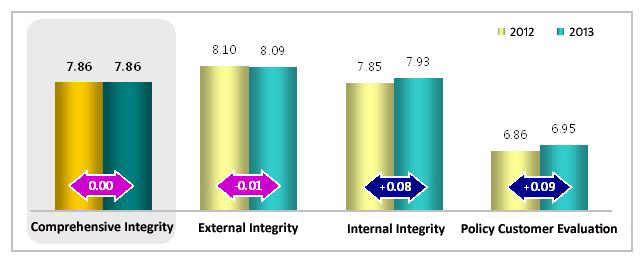2013 Integrity Index of Korea scores 7.86
- Date2014-01-02
- Hit4,508
Military Manpower Administration, Statistics Korea, Seoul City & Jeju Provincial Office of Education recorded the highest levels of integrity
The ACRC announced the results of the 2013 Integrity Assessment of 653 public organizations, including central administrative agencies, local governments, offices of education, and public service-related organizations.
Conducted by the ACRC every year, the Integrity Assessment is based on a survey that was administered to 165,191 citizens (public service users), 56,284 staff members of public organizations, and 18,507 policy customers consisting of experts, local residents, and school parents on a total of 2,628 public duties. Integrity levels of public organizations are calculated from the results of the survey on experience and risks of corruption, from which points are deducted for the occurrences of corruption or actions lowering the reliability of the survey results, for example, by asking prospective respondents for positive responses.
The comprehensive integrity level of all public organizations in 2013 was 7.86 out of 10, remaining the same as in the previous year.

2013 Integrity Index
The survey findings indicated a decrease in the "experience of corruption" compared to the last year. The number of public service users who "offered money, entertainment or conveniences to public officials" was slightly reduced to 0.7% from 1.0 % in 2012. The respondents' experience of "illegal/improper spending of budget" and "undue instruction of work" also dropped from 9.5 % to 6.2% and from 8.0 % to 6.6% respectively over the last year.
In contrast, "culture of integrity" and "anti-corruption system" received scores lower than the previous year: the score for "handling work based on relationships" decreased from 7.38 in 2012 to 6.82 points; "mediation, solicitation or influence-peddling within the organization," from 8.68 to 8.44 points; and "effectiveness of whistleblower protection system," from 7.72 to 7.24 points.
In the case of central administrative organizations, the Statistics Korea was the organization with the highest level of integrity among general administrative organizations, while the Military Manpower Administration scored highest among organizations carrying out investigative/enforcement/regulatory functions.
In the local government category, Seoul Metropolitan Government received the highest integrity score among metropolitan city governments; Osan-si of Gyeonggi-do, Boeun-gun of Chungcheongbuk-do and Mapo-gu of Seoul for the respective categories of cities (si), counties (gun) and districts (gu); and the Jeju Special Self-Governing Provincial Office of Education among offices of education.
In the case of public service-related organizations, Korea Southern Power (state-owned companies), Korea Technology Finance Corporation and Korea Housing Finance Corporation (quasi-government agencies), Gyeonggi Tourism Organization (local public corporations), Daegu Metropolitan City Environmental Installations Corporation (local industrial corporations), Korea Institute of Science and Technology (research institutes), Export-Import Bank of Korea (other types of public service-related organizations), and Korea University of Technology and Education (national and public universities) exhibited the highest levels of integrity respectively.
The assessment revealed that 0.7% of citizens gave public officials bribes, entertainment or conveniences over the past year, which was a slight decrease from 1.0% of 2012.
The highest ratio for the amount of bribes and entertainment that citizens offered to public officials was from KRW 60,000 to KRW 150,000 (25.0% and 29.8%, respectively), and the highest ratio for the frequency of offering was once for bribes and twice for entertainment (35.0% and 29.2%, respectively). The respondents who offered more than KRW 10 million accounted for 0.9% of those who have bribed public officials.
The most common reason for bribery was "customary practice or courtesy" (40.7%), followed by " business processing" (27.4%).
The rate of the public service users who experienced corruption indirectly, i.e., whose friends, colleagues or business associates offered bribes to public officials, stood at 1.7%, falling from 3.2% of last year.
According to the survey of the internal members of public organizations, there were decreases from the previous year in the rate of experience in illegal/undue budget execution (9.5% in 2012 to 6.2% in 2013), in improper instruction of work (8.0% in 2012 to 6.6% in 2013), and in offer of money or entertainment to win favor in personnel measures (0.8% in 2012 to 0.5% in 2013). The corruption experience rates were relatively higher in local governments and offices of education than in central administrative agencies.
Among the policy customers surveyed, 3.2% replied that they or their acquaintances had given money, entertainment or conveniences to public officials, showing a significant decrease from 7.7% in 2012. However, the rate is still high compared to that of the public service users who directly offered bribes to public officials (0.7%) and that of those whose acquaintances committed bribery (1.7%).
In the case of central administrative agencies, "investigation" was the duty recording the lowest score, while "construction management and supervision" was the lowest among metropolitan and provincial governments, "permission/approval" among city/country/district governments and "management of sports clubs" among offices of education.
Based on the results of this year's Integrity Assessment, the ACRC will encourage the public organizations with low levels of integrity to make voluntary efforts to reduce corruption by strengthening its integrity consultancy service and the Anti-Corruption Competitiveness Evaluation for such organizations. At the same time, it will spread the best practices of the organizations with high integrity scores in order to raise the levels of integrity in the public sector as a whole.









